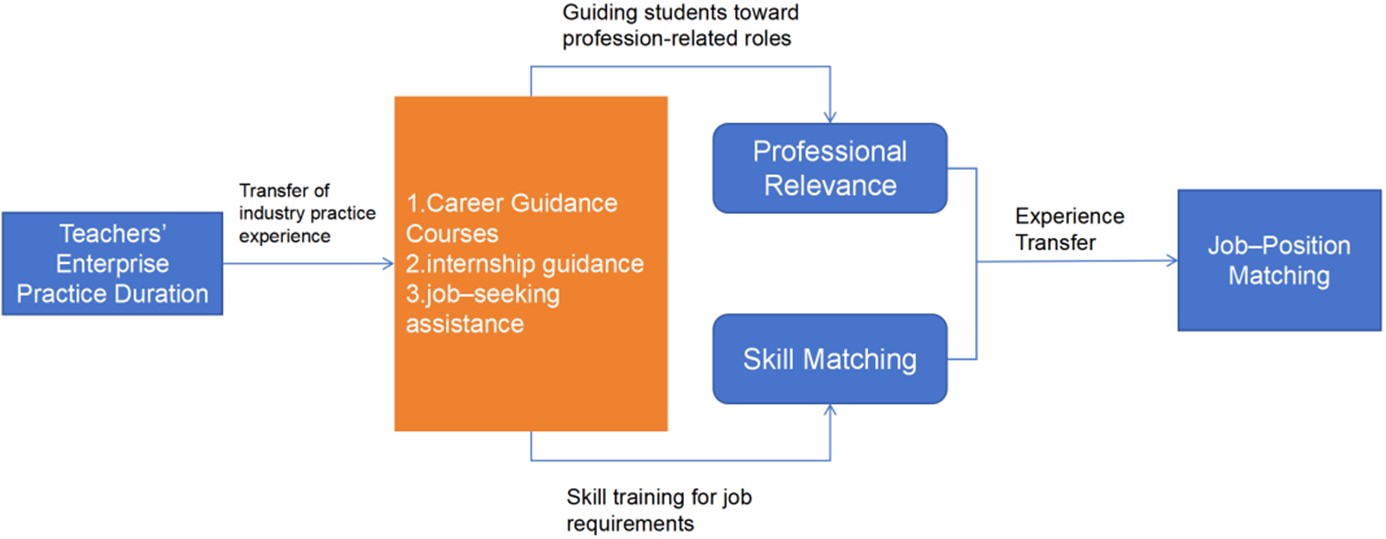The Impact of Vocational College Teachers' Enterprise Practice Experience on Students' Job Matching
Abstract
This study examines the relationship between the duration of vocational college teachers’ enterprise practice experience and the job–position matching of their students, using both institutional evaluations and students’ self-assessments. Data were collected from 271 graduates of the School of Robotics and Intelligent Manufacturing at Jiangxi University of Science and Technology. The analysis employed descriptive statistics, correlation analysis, one-way analysis of variance (ANOVA), and Tukey’s post hoc tests to compare three teacher experience groups (0–2 years, 2–4 years, and over 4 years). Results show a significant positive association between longer enterprise practice and higher institutional job–position matching scores, with the best outcomes for students taught by teachers with over four years of industry experience. While students’ self-assessments also increased with teacher experience, the differences were not statistically significant. Students consistently rated their job–position match higher than institutional evaluations, reflecting possible differences in assessment perspectives. These findings emphasize the value of sustained industry engagement for teachers in enhancing the alignment between vocational education and labor market needs, and offer implications for curriculum development, teacher training, and industry–education integration policies.
References
Fazio, M. (2020). Measuring job fit: A multi-dimensional approach. Journal of Vocational Behavior, 121, 50–68. https://doi.org/10.1016/j.jvb.2020.103476
Green, F., & Henseke, G. (2016). The role of vocational education and training in career outcomes: Evidence from Europe. International Journal of Training and Development, 20(2), 103–120. https://doi.org/10.1111/ijtd.12071
Ke, Y. (2007). Research on the evaluation index system of employment quality for college graduates [Report]. Vocational Education Research Center, Fujian Provincial Department of Education.
Kristof-Brown, A. L. (2005). Consequences of individuals’ fit at work: A meta-analysis of person–job, person–organization, person–group, and person–supervisor fit. Personnel Psychology, 58(2), 281–342. https://doi.org/10.1111/j.1744-6570.2005.00672.x
Li, J. (2025). Vocational undergraduate education responding positively to industrial transformation and public education demands—2024 research and practical advances in vocational undergraduate education. Educational Research Journal. Retrieved from https://www.chinazy.org/info/1006/19402.htm
Ministry of Education of the People’s Republic of China. (2019). National implementation plan for vocational education reform. Ministry of Education.
Robst, J. (2007). Education and job match: The relatedness of college major and work. Economics of Education Review, 26(4), 397–407. https://doi.org/10.1016/j.econedurev.2006.08.003
Salas-Velasco, M. (2021). Mapping the (mis)match of university degrees in the graduate labor market. Journal for Labour Market Research, 55(1), 14. https://doi.org/10.1186/s12651-021-00297-x
Silina-Jasjukevica, G., Lūsēna-Ezera, I., Ilisko, D., & Surikova, S. (2025). Promoting effective vocational education and training teacher’s professional development and its transfer to practice: A systematic review. Education Sciences, 15(5), 596. https://doi.org/10.3390/educsci15050596
Tanggaard, L. (2007). Learning at trade vocational school and learning at work: Boundary crossing in apprentices’ everyday life. Journal of Education and Work, 20(5), 453–466. https://doi.org/10.1080/13639080701814414
Wei, H. (2024). The impact of strengthening practical teaching in vocational education on improving students’ employability. Applied Mathematics and Nonlinear Sciences, 9(1), 1–18. https://doi.org/10.2478/amns-2024-2323
Xia, L., & Luo, Y. (2025). Review of the integration of industry and education in China's vocational education and school–enterprise cooperation. Advances in Social Sciences, 14(3), 429–435. https://doi.org/10.12677/ass.2025.143232
Xie, H., & Xiao, H. (2024). Some issues in the high-quality development of teachers in the new era in China. Advances in Social Sciences, 13(9), 106–113. https://doi.org/10.12677/ass.2024.139789
Xue, P. (2025). Vocational teachers with industry experience: Transforming expertise into effective teaching. Vocational and Technical Education. Advance online publication. https://doi.org/10.54844/vte.2025.0936
Yang, Y. (2022). Annual report on the quality of higher vocational education in China (2022). Higher Education Press.
Yu, T., Yan, X., & Jin, Y. (2024). Vocational education in China. In Education in China and the World (pp. 361–418). Springer. https://doi.org/10.1007/978-981-97-7415-9_8
Zong, G. J., Yu, X. W., & Yu, B. C. (2025). The connotation construction of modern industrial colleges in vocational undergraduate schools under the background of industry–education integration. Modern Vocational Education, 16, 17–20. https://doi.org/10.26689/ief.v3i6.10976


This work is licensed under a Creative Commons Attribution 4.0 International License.
Copyright for this article is retained by the author(s), with first publication rights granted to the journal.
This is an open-access article distributed under the terms and conditions of the Creative Commons Attribution license (http://creativecommons.org/licenses/by/4.0/).








1.png)

















